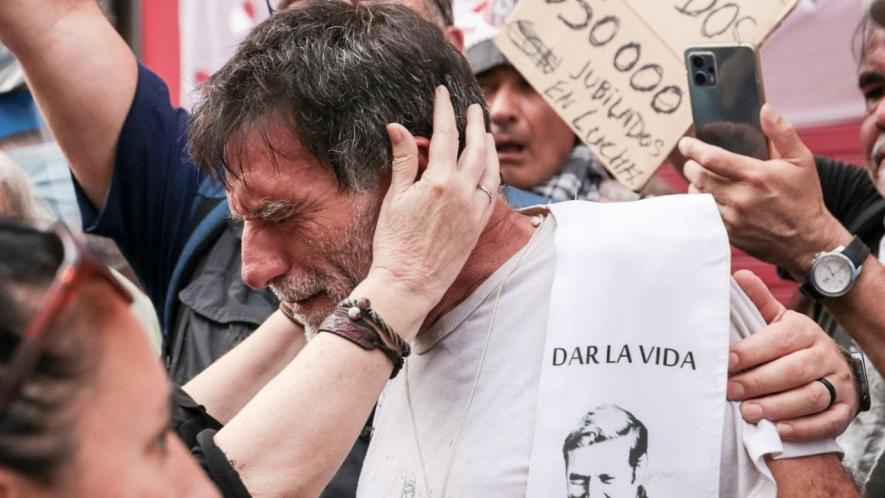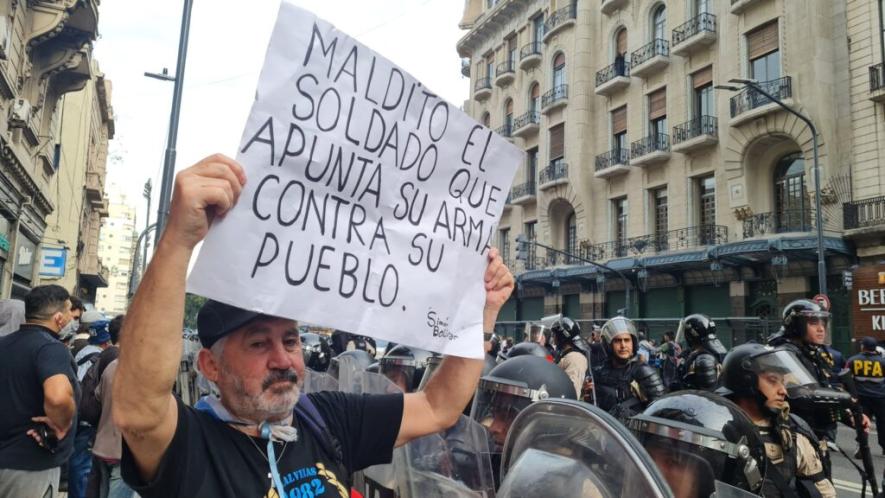Argentinian Retirees Continue Their Fight for Dignity

Father Paco during the retirees protest in Buenos Aires on May 14. Photo: UTEP
For several months now, Argentine retirees have continued a young anti-neoliberal political tradition in Argentina: they have been demonstrating in front of the National Congress every Wednesday against the economic policies of Milei’s project, which have greatly impacted their lives.
The recent tradition dates to the 1990s, during which several retirees came out on Wednesdays to demand pension increases during the neoliberal government of Carlos Menem, who froze pensions. Now, this time around in their protests against Milei, new sectors have joined the demonstrations: soccer fans, children of retirees, students, etc.
Repression against retirees
It seems that the government in turn, is inaugurating its own sad political tradition: repressing the elderly who demand a more dignified life. Last May 14, the forces of law and order organized an operation with dozens of vehicles and once again violently repressed the retirees who were marching around the Congress, just like the Mothers of the Plaza de Mayo. Social media shows how the police repressed the elderly, which has caused much indignation among the Argentine population. It has been reported that at least four protesters were arrested after clashes with the police.
One of the protesters rebuked a policeman: “You think you are big and you are going to beat me. You are beating us.” Another protester said: “[The police] take us to the sidewalk, and there they throw pepper spray at us. Every Wednesday, they do the same thing. The police and Bullrich [the Secretary of Security] should be in jail.”

“Damned is the soldier who turns his arm on the people” reads a placard at the retirees protest on Wednesday, May 14 in Buenos Aires. Photo: UTEP
One of the injured was Nico Caropresi, president of the Movement of Excluded Workers, who, according to Juan Grabois, was assaulted while trying to help a pensioner who was being attacked: “Nico literally put his body to defend the retirees, and specifically Father Paco, from the police beating. He endured the pepper spray and the [police] blows. This is what a popular leader does. Nico is not the only one, but he is one of the best.”
Grabois added that former president Cristina Kirchner was at the Homeland Institute at the time and she came down and greeted the popular leader. “If it were not part of the national tragedy, it would be cinema. The problem is that it is not fiction. It is reality. And these people are taking us to places that are very difficult to return to. It is up to us, each one of us, from our trenches, to leave everything to defend what is left of social justice until the executioners of the people are gone,” Grabois declared.
Neoliberalism impoverishes retirees
Following economic adjustment policies, including Milei’s obsession with reducing inflation (in accordance with the requirements of the International Monetary Fund), the elderly have seen their purchasing power plummet.
This also related to the increase in water, gas, and electricity prices following the elimination of subsidies by Argentina’s extreme right-wing government. Milei’s administration also removed a variety of medicines from the list of free drugs, forcing retirees to now have to pay for them, which has left many unable to buy their prescriptions.
Two-thirds of retirees receive the minimum income, which corresponds to USD 300 per month. Thus, the National Institute of Statistics and Census (INDEC) stated that the number of poor elderly people doubled during the first semester of Milei’s government.
A few weeks ago, Milei announced that he would not extend the pension moratorium for retirees, which, for now, allows those over 65 years of age who did not contribute the necessary years to Social Security to have access to a minimum retirement. After Milei’s refusal to have the state cover this item, it is expected that many more elderly people will fall into a very precarious economic situation. Estimates say nine out of ten retired women will no longer receive this support from the state. Women who, for many years, were unable to contribute regularly due to unemployment and unrecognized care tasks they did at home.
For now, it does not seem like Milei will give up his political program, even if it means suffering and uncertainty for thousands of elderly people. At the same time, the retirees have shown an enormous capacity for resistance, so it is unlikely that they will give up their struggle anytime soon.
Courtesy: Peoples Dispatch
Get the latest reports & analysis with people's perspective on Protests, movements & deep analytical videos, discussions of the current affairs in your Telegram app. Subscribe to NewsClick's Telegram channel & get Real-Time updates on stories, as they get published on our website.
























